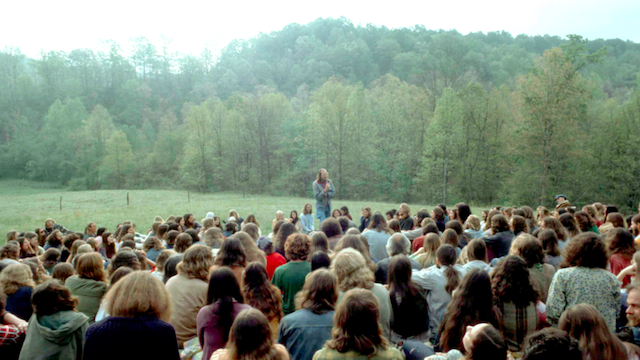
 STEPHEN GASKIN ADDRESSING FOLLOWERSEmotional return to a lost past: "The rise and fall of America’s largest socialist utopian experiment"
STEPHEN GASKIN ADDRESSING FOLLOWERSEmotional return to a lost past: "The rise and fall of America’s largest socialist utopian experiment"In
American Commune, sisters Rena Mundo Croshere and Nadine Mundo, now TV producers in Los Angeles, return for a reunion of The Farm, the commune in rural Tennessee founded by Stephen Gaskin in 1970, of which they were a part as children. This is their first time back to this, the country's largest Utopian experiment, since 1985. The Mundos are seen in the country with their father, brother, and mother. Th latter was raised in an orthodox Jewish family in Beverly Hills and their Puerto Rican-born father was from the Bronx. This is definitely an ambivalent and emotionally complex experience for the two filmmakers, who long avoided confronting their past. It's a surprising story of which most of us know very little -- though The Farm was national news several times.
As Rena Mundo Croshere explains in a separate
article, when the commune disintegrated and there was a mass exodus in 1983-85 brought about by poverty and FBI investigations, their parents' union had dissolved too. Her mother consequently took Rena and Nadine to California, and their father, Jose, took his new wife and their younger brother Miguel and went in the opposite direction. The girls were taken to stay with their grandfather, a successful surgeon, in Pacific Palisades, where their neighbors were Eddie Albert and Goldie Hawn, on the way to living in a dilapidated apartment in Santa Monica. At twelve, trying to be "normal" in the Reagan era while coming from a childhood her contemporaries would not understand, Rena had a crushing sense of "otherness" in her new middle school and tried desperately to fit in with makeup, Madonna-style jewelry, and straightened and bleached hair. Both sisters report embracing pop culture, makeup, and jewelry in an effort to adapt to what for them was like a foreign country. It took Rena till some time at UC Berkeley to forget about being in a dysfunctional sorority and be a bit more proud of who she was. But the formative years in the commune remained somewhat a lost memory.
The documentary, supplied with plenty of footage and tapes -- even Walter Cronkite reported on this -- recounts how 300 hippies assembled by guru Gaskin -- whom we see speaking to his followers in San Francisco -- went in a caravan of buses and cars from San Francisco and found and bought 75 acres near Summertown, Tennessee, very near where the Ku Klux Klan was founded. The girls' two parents had met in San Francisco and went with the first wave of seekers who founded the commune. These young hippies pooled inheritances and cash on hand and set out -- "completely green," with no knowledge -- to be farmers, living independently and simply as alcohol-free vegans in a Christian community, taking a vow of poverty, living communally without money. The locals were fearful of them at first, but eventually taught them farming and logging.
This is powerful stuff, because The Farm was taking society apart and putting it back together again. No wonder the FBI was infiltrating them and reporting on them: this was radical. Besides, mainstream America by this juncture, 1970, had long had a deep fear of socialism, seen as the enemy of capitalism. Using a wealth of archival footage plus new interviews from the reunion with Farm leaders, lawyers, accountant, and their own contemporaries, Rena and Nadine present a history of the commune and a reexamination of it from the prospective of today.
By the late Seventies, the sisters' account goes, The Farm had grown from 300 to 1,500 members and become viable, pioneering the use of solar power, with jobs, a school, a laundromat; producing and selling soy milk. Gaskin's wife, Ina May, was head of midwifery: contraception was discouraged and there were lots of kids born. Ina May herself had a hand in about 2,300 births, she recounts. She became a world-renowned midwife, authoring a well-known book,
Spiritual Midwifery.) Multiple families lived crowded together in poor shacks; kids roamed around in large groups. Most were happy. However, they felt the pressure to be happy, not to show anger, to subsume their individuality in the group. Even having her birthday celebrated felt uncomfortable to one of the girls, because it singled her out. Their parents were not happy together, but it was hard to split.
The Farm had a successful relief program around the world -- Africa, Latin America, Washington, DC, the South Bronx -- called Plenty (still active). This, among other things, made the FBI suspicious. The FBI infiltrated, investigated, and raided The Farm suspecting it to be guilty of marijuana growing, though their invasion uncovered only a field of ragweed and melons. (The commune members did do psychedelics: Rena and Nadine's parents got married on magic mushrooms.) After this bad publicity, the Farms' loans began being tightened and eventually cut off altogether. By 1983 money became a huge problem, which their leader, devoted to spiritual and Utopian ideals, steadfastly refused to acknowledge. Poverty reigned, but Gaskin opposed the necessary measure of letting commune members get outside jobs and pay dues and would not stop permitting new, generally penniless, people to come in, and he was replaced by a board. Gaskin, still living on the commune, now a much smaller "intentional community," calls this change of leadership a "coup"; it occurred when he was away on a Plenty mission. But he feels happy with his accomplishments, the last of which, he thinks, was managing to remain there. The sisters feel intimidated by Gaskin even today, but interview him, still living in his original commune home.
The experience of the reunion in Tennessee is cathartic for the sisters and others. Nadine explains to the camera how going through the woods to school at The Farm was like an "adventure." Speaking emotionally to a circle of her generation at the reunion, she admits that she has always felt like a nomad. "And how you are home," others chime in. In a coda, Nadine finds during a serious bout with colon cancer in NYC shortly after the reunion that scores of her Farm "family" remember her now. They send her get well cards and $10,000 to help with medical fees. She finds seeing her divorced, long-estranged parents standing together at the hospital "a moment of grace."
American Commune skillfully interweaves its present-day account of the reunion with family snapshots and videos, vintage films of the commune in early days and a brief narrative of its history. Archival material includes not only the reports of Walter Cronkite and Dan Rather but a clip of Gaskin and his wife in a contentious appearance on the Phil Donahue show. We also glimpse many public gatherings of the original commune meeting -- dancing in a field, concertizing, meeting in church, and hoards of small (and later teenage) kids together. All this painstakingly accumulated and seamlessly interwoven material along with intense current interviews, provides an vivid, emotional, thought-provoking journey. It's another useful chapter in the history of the American counterculture of the Sixties and Seventies.
American Commune, 90 mins., debuted at the Canadian Hot Docs Festival 29 April 2013 (
interview); it also was included in the San Francisco Jewish Film Festival, as part of which it was screened for this review. It shows in the SFJFF Aug. 10 and 11.





